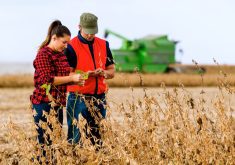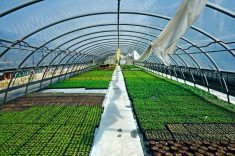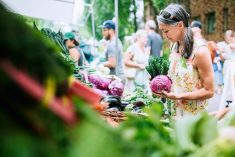There is a lot going on in the world today and it easy to become overwhelmed with the pressure.
Farmers are focused on the needs of our operations and our families, but society is looking to those on the farm to help them heal. The frank realization of our importance in the social fabric came into focus during a conversation with my neighbour.
He’s a ‘down to earth’ kind of guy who thinks a lot and finds it quite fascinating that I am from the farm. This brings to light what Dr. Temple Grandin has been trying to tell us for decades – that our ordinary is someone else’s extraordinary.
Read Also

Deep cuts to ag research jeopardize Canada’s farming future
The huge cuts to ag research at Agriculture Canada are being widely panned by farm organizations, but there seems to be little hope of the government reversing its decision.
We were discussing the state of the nation and the world, from food to conflict and from drugs to disease. You get the picture — a rather somber conversation about the realities for many, especially those who live in conflict. And as we deepened the dialogue to solutions, he very softly said, “If you (farmers) could heal the soil, you could heal us all.”
Think about this from the perspective of not only a societal cry but also an honourable call to duty.
We are the sum of what we put into our bodies, what we believe and feel. As persons of the earth, farmers are closer to the roots of humanity than any other profession. So profound is our knowing that those in agriculture are often at a loss for the words to explain their ties to the soil and their love for the space in which they live.
I cannot express in simple words my own ties to food production because it is so intimate in nature. Yet, like my neighbour, my thought process is global and also appreciative that solutions are local and that the world changes one small act at a time.
What do we need to appreciate in this statement made by my non-farming friend? I believe that by healing the soil, my friend was not referring to carbon sequestration or some sort of sustainable practice.
He was thinking of it being healed to the point where it was self regenerating with systems in place to make that happen; that the soil’s memory once again nurtured beautiful food that was nutrient dense and of benefit to our bodies and our minds.
That is quite a challenge for a food production system that has created soil co-dependencies to achieve the required volume to feed our global populations. In reality, global farmers produce enough food for every person on earth to enjoy the required calories each and every day.
We do not have a food issue. We have distribution, corruption, conflict and competition issues that keep food out of the hands of those that need it. And in shorting those persons, they turn to what they can obtain, regardless of the impact of that choice to the very soil on which it was grown.
In countries of conflict, 50 per cent or more of food production land is negatively affected. It may be taken out of production from land mines, bombing, contamination or the regional droughts created by unloading a massive amount of chemicals in the air. That land may be dead because the birds and insects have been destroyed, the water is poisoned, the port is closed to inputs or because the cows that once fertilized it are gone.
As you read this, there are 110 nations in conflict and it does not take long to destroy the ground that feeds us. In a few short months, over 46 per cent of cropland in Gaza has already been destroyed. That leaves a huge gap in food security for the people today and in the future.
So often farmers in Canada and around the world are accused by those of a self-proclaimed higher authority as the problem in climate challenges. This is to divert our thinking from the realities of those same stakeholders’ participation in conflict, corruption and anti-competition.
War is profitable. Providing the food post-war is profitable. At some point, though, the countries supplying that food will tire their land beyond regeneration.
There is no hope of democracy or peace without food. Agriculture is the solution. While other countries try to rebuild and gingerly walk through mined fields, Canadian farmers are privileged to have the ultimate natural medicine at their feet.
Our lives are extraordinary and though we do produce nutritious plant and animal crops for ourselves and the world around us, we must pause to consider the potential harm if we continue to push the soil too hard or do not stop our own destruction of watersheds, wells, forests and fields.
Once gone, there is no turning back. Who will feed us then? If soil can heal us – and I believe this to be true – we must be mindful of every practice and policy that impacts its ability to heal, for it is the primary physician through food and the conductor of our wellness on the path ahead.
















